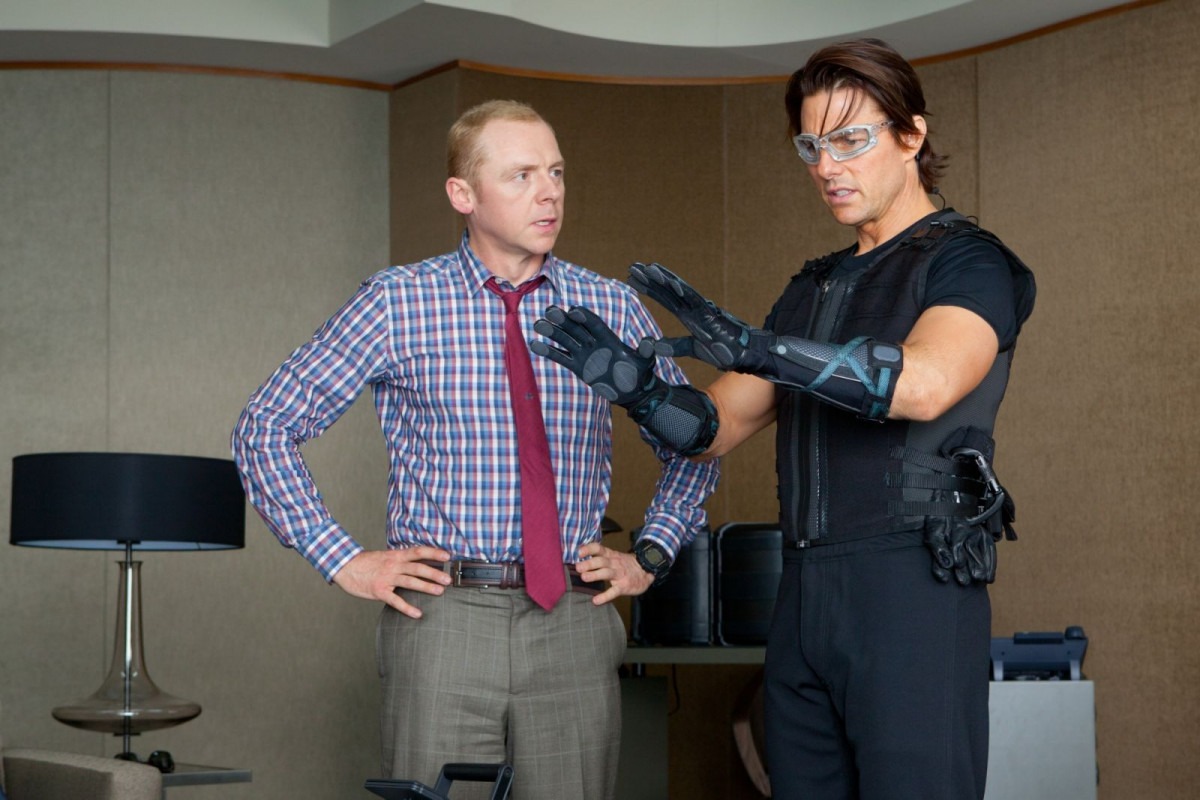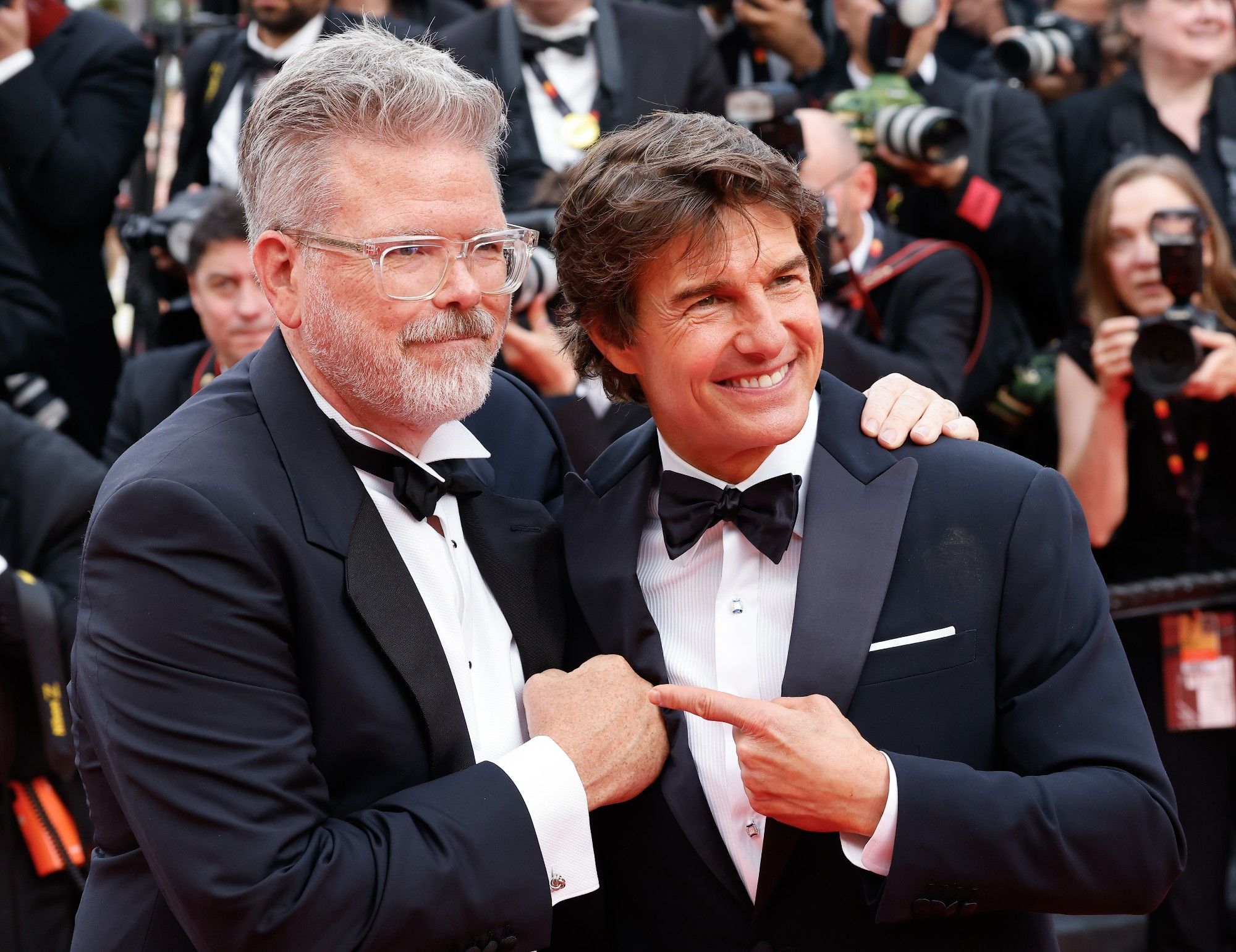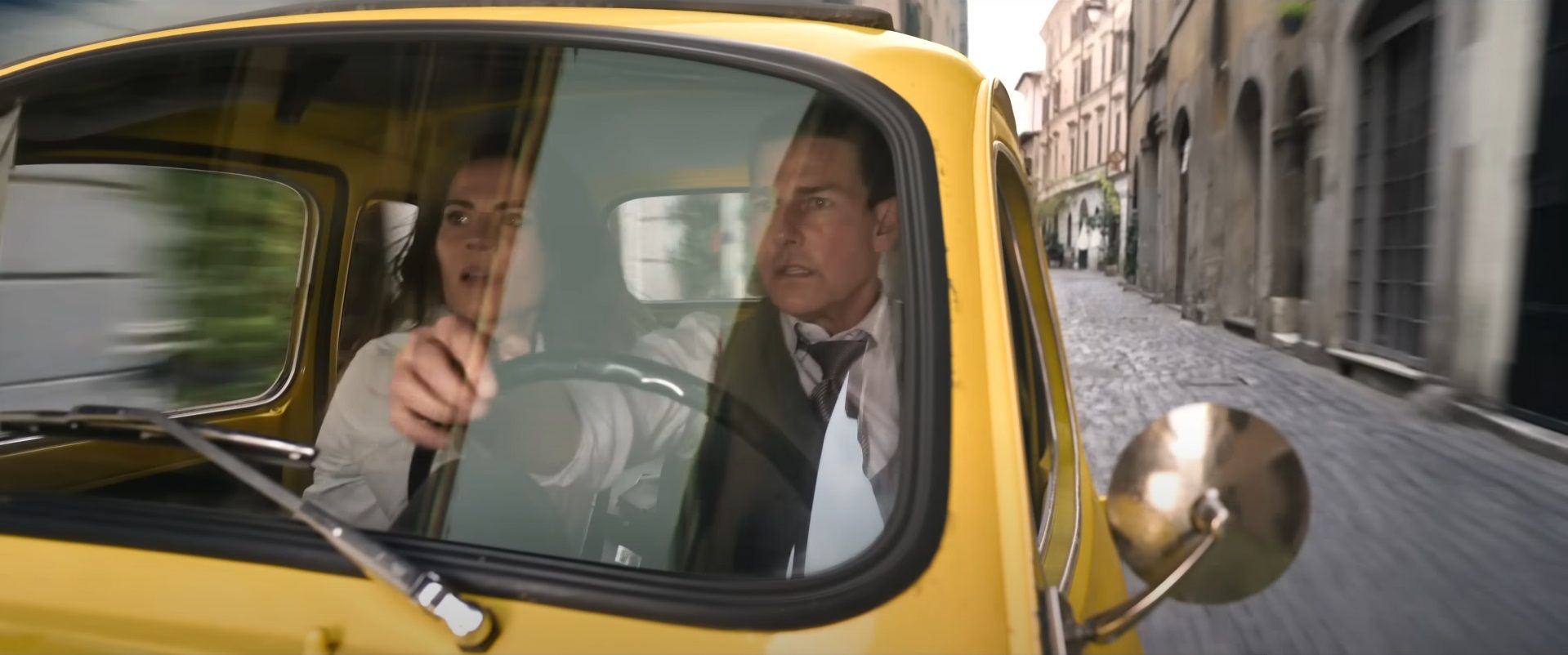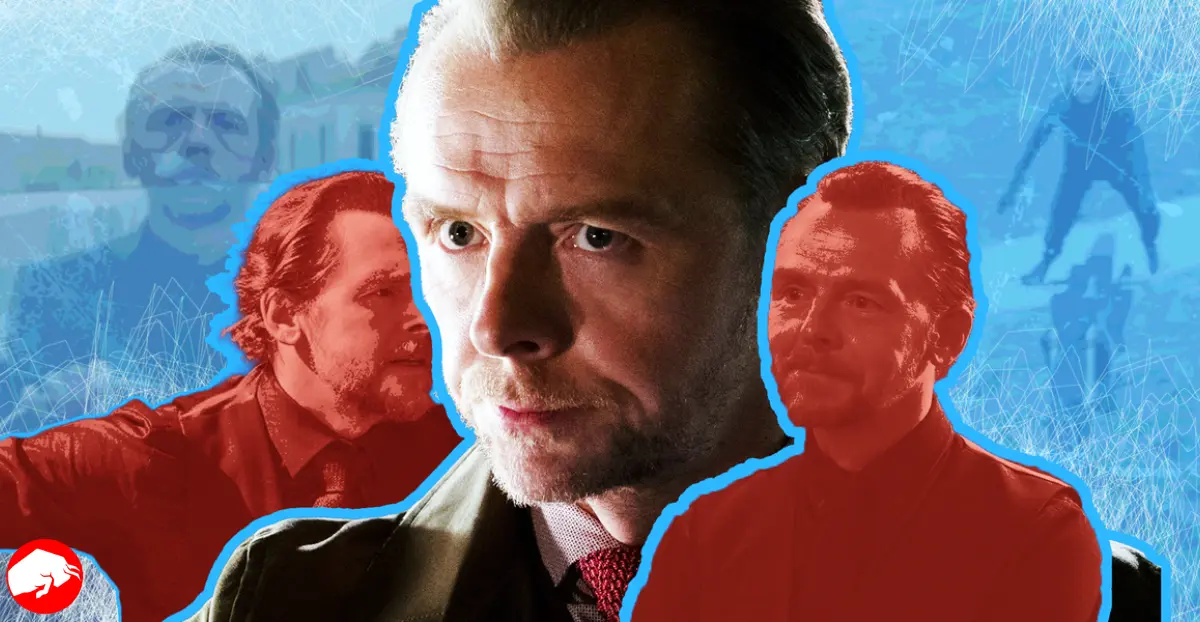Imagine the pulsating rhythm of The Beatles’ famous song ‘A Hard Day’s Night’ playing as we dive into the world of filmmaking, where Simon Pegg likens the partnership of Tom Cruise and director Christopher McQuarrie to that of legendary musicians John Lennon and Paul McCartney.
Throughout five intense and heart-racing Mission: Impossible installments, Simon Pegg has cemented his place in the core ensemble of this long-running franchise. His character, Benji Dunn, the quippy hacker, and sometime field agent, has moved from being an outsider questioning the rationale of Ethan Hunt (Tom Cruise) to becoming a true believer in his cause.
This profound character development can be traced back to the writing and directing expertise of Christopher McQuarrie, affectionately known as McQ.
Enter the Master Problem Solver
When Simon Pegg was first introduced as Benji Dunn in the Mission: Impossible series, his character served as a comic relief and skeptic among the ranks. As an outsider looking into the world of high-stakes espionage and daring missions, his perspective was initially mirrored in his dialogue, often uttering the quintessential question, “What the fuck are we doing here?”. He seemed to question, just as the audience did, the logic behind the complex and seemingly impossible missions the IMF team undertook.

In doing so, Benji personified the viewers’ doubts and concerns, effectively making him a surrogate for the audience within the narrative. Over time, however, Pegg’s character saw a considerable evolution. From a bemused, tech-savvy support character, he grew into a crucial member of Ethan Hunt’s team, sharing the screen time and the risk equally with Tom Cruise’s protagonist.
Benji’s transformation from a novice to a seasoned field agent was gradual, gaining in-depth knowledge of the operations and exhibiting unwavering loyalty to Ethan’s cause. He started to understand the motivation behind the dangerous escapades of the IMF team, fully comprehending and even embracing the gravity and stakes of the situation.
This profound character arc, this metamorphosis from the questioning outsider to a pillar of the team, didn’t happen by chance. A significant portion of the credit for this narrative accomplishment is owed to Christopher McQuarrie, the man who stepped into the franchise while making Mission: Impossible — Ghost Protocol.
In Pegg’s words, McQuarrie was the “master plumber” called upon to repair the metaphorical pipeline of the franchise. With a reputation for problem-solving and his ability to bring clarity and coherence to complex narratives, McQuarrie was the perfect choice for the job. But the director didn’t merely stop at doing the necessary repairs; he became instrumental in shaping the franchise’s future.
Working closely with Tom Cruise, the face and the driving force behind the series, McQuarrie started to leave his mark on the Mission: Impossible universe. The two formed a formidable partnership, akin to the architects of an intricate blueprint, constructing a narrative design that would define the franchise for the years to come.
Their collaboration was evident and impactful in creating Mission: Impossible — Dead Reckoning Part One, a pivotal installment in the series. This film served as a high point in the narrative, marking a significant evolution from the franchise’s inception in 1996 when Cruise first stepped into the shoes of Ethan Hunt.
Not only did it establish the series’ fresh direction, but it also paid homage to its roots, tracing back to the seeds planted in the initial chapters of the saga. This dual accomplishment demonstrated the unique blend of respect for the franchise’s history and vision for its future that Cruise and McQuarrie brought to the table, shaping the Mission: Impossible series into the thrilling phenomenon it is today.
A Chat with Variety

In a recently conducted interview with Variety, an esteemed name in entertainment journalism, Simon Pegg had the chance to elaborate on the multi-faceted creative process behind the Mission: Impossible series. The discussion was not merely a casual conversation; it was a moment where Pegg threw light on the exceptional creative talents of Christopher McQuarrie and how he, along with Tom Cruise, has changed the landscape of this beloved franchise.
Simon Pegg’s revelations were not just confined to singing praises for McQuarrie and Cruise. The interview also allowed him to delve deep into the uncharted territories of his character, Benji Dunn. Benji, who was once the questioning outsider turned dedicated team member, has had an interesting trajectory in the franchise, and Simon Pegg was more than happy to dissect and discuss the development of his character.
It was an opportunity for Pegg to shed light on how McQuarrie and the writing team managed to maintain Benji’s arc and ensure his character’s evolution while staying consistent with the narrative of the entire franchise. He shared how, as an actor, he has navigated through this journey, ensuring that his character does not lose its distinctiveness and charm amidst the high-octane action and escalating plotlines.
Beyond the character study, the interview presented an opportunity to discuss one of the franchise’s key challenges: maintaining continuity in a long-running series without undermining emotional stakes. Simon Pegg shared his insights into how the Mission: Impossible series has kept its audiences engaged.
Despite spanning decades and multiple films, the franchise has effectively sustained the delicate balance between consistent storytelling and high emotional stakes. It has succeeded in offering audiences thrilling story arcs without making them feel detached from the characters they have grown to love.
Towards the conclusion of the discussion, Pegg did not shy away from teasing the franchise’s future. With the anticipation for the sequel, Mission: Impossible — Dead Reckoning Part Two, brewing among the fans, Pegg was careful not to reveal too much. However, he left some tantalizing crumbs, hints that suggested thrilling developments and heightened stakes in the upcoming installment.
These hints, albeit non-specific, stirred up curiosity among fans, making them look forward to what promises to be another memorable addition to this globally admired franchise.
Working without a Safety Net
Simon Pegg has often had to clarify a misconception regarding the filming process of the Mission: Impossible franchise. There’s a prevalent belief that the actors and the team proceed without a fully fleshed-out script, almost appearing to improvise or ‘wing it.’ However, Pegg adamantly asserts that this is far from the truth.
On the contrary, they always work with a script, albeit not a traditionally detailed one. He explains that what they use as a guide is more of a skeletal framework or outline of the scene at hand. This basic blueprint is then built upon and expanded but never disregarded. The team doesn’t just unthinkingly venture into the unknown; they have a defined roadmap that directs the flow of the narrative.
Christopher McQuarrie’s unique directorial style takes center stage in this context. McQuarrie, a visionary director, allows the script to be fluid and adaptable, integrating the day’s specific circumstances into the storytelling process. The locales, characters, actors, and even the unpredictable elements of the shooting environment influence the scene’s evolution, resulting in a more nuanced narrative.
Certainly, this method comes with challenges, as it requires a high degree of flexibility and rapid problem-solving. Yet, Pegg admits that the thrill of navigating these challenges and adapting to the ever-evolving scenarios has enriched his experience as an actor. He even confesses that working under McQuarrie’s direction has greatly enhanced his understanding of filmmaking, shaping his approach to the art in ways he had not anticipated.
The experience, though demanding, has been a profound learning journey for him.
The Swiss Watch Comparison
Screenwriting and direction can be as intricate and precise as a finely tuned Swiss watch, a symbolism often associated with perfection and meticulousness. In his discussion about Christopher McQuarrie’s unique style of screenwriting, Simon Pegg uses this very analogy to describe the precision inherent in McQuarrie’s methodology.
This description offers a remarkable insight into the processes and strategies employed by McQuarrie that ensure the seamless unfolding of the narrative. The comparison goes further, as Pegg draws parallels between McQuarrie’s approach and his collaboration experiences with Edgar Wright, another prominent figure in the cinematic world.
While Pegg readily admits that his approach to storytelling greatly differs from McQuarrie’s, he also acknowledges that McQuarrie’s methods have a certain depth of understanding and precision that he finds both enlightening and inspiring. The key difference lies in each director’s preferred tools and transitions to shape their narratives.
Edgar Wright, Pegg explains, has a fondness for precise plotting and meticulously planned scene transitions. This meticulous approach ensures that every element falls perfectly into place, similar to a Swiss watch’s fine-tuned cogs and gears. On the other hand, McQuarrie’s narrative style is more organic. He allows the story to unfold naturally, guided more by the actors’ instincts and the situation’s dynamics than by a rigid script.
Pegg has discovered this approach has benefits and has added an entirely new dimension to his understanding of filmmaking. He has found this experience quite enriching, providing him with a broader perspective on the various methodologies employed in storytelling.
Filmmaking Extraordinaire
The world of action films thrives on thrill, intelligence, and innovation. These elements, when blended correctly, create the perfect cinematic recipe. A master chef in this regard is Christopher McQuarrie, whose knack for crafting such films is undeniably impressive. Although it would be ideal for such talent to be more commonplace, the unfortunate reality is that it is unique.
But what is the secret ingredient behind McQuarrie’s distinct creativity? According to Simon Pegg, it can be traced back to his alliance with superstar Tom Cruise.
Their partnership, a vital element of McQuarrie’s creative process, is a bedrock for his ambitious filmmaking methods. It provides a secure environment for McQuarrie to experiment and implement new and innovative approaches without the fear of repercussion. This symbiotic relationship kicked off during the making of Ghost Protocol and has only deepened and matured since then.

Like the legendary songwriting duo Lennon and McCartney, they are each masterful in their respective skills. However, their combined creative force is exponentially greater, culminating in a cinematic synergy that is rare and powerful.
Cruise and McQuarrie are relentless in their pursuit of fresh storytelling techniques and technological advancements, constantly pushing the boundaries of what’s possible in filmmaking. They are akin to explorers charting unknown territories, always looking for fresh ways to weave their narratives and breathe life into their creations.
This continuous evolution and their ability to absorb and incorporate new techniques and technologies help them craft a narrative style that stands apart. It’s a style that remains true to the essence of action cinema while also breaking new ground, always keeping audiences on their toes and setting a benchmark for others in the industry.
Embracing Legacy and Innovating
With Dead Reckoning, a reverberating wave of nostalgia and renewed excitement pulses through the heart of the Mission: Impossible franchise. This groundbreaking installment serves as a grand tapestry that skillfully weaves together many themes and ideas, all of which have been progressively explored since the series’ inception.
As viewers traverse through the labyrinth of this intricate narrative, they will find an abundance of references and callbacks that will delight the devoted fanbase. Simultaneously, Dead Reckoning deftly lays the foundation for new, captivating developments, effectively fanning the intrigue for what lies ahead.
For instance, the cinematic resurrection of Henry Czerny’s character, Kittridge, offers a thrilling blast from the past while underlining the filmmakers’ commitment to honoring the franchise’s rich history. This is not mere nostalgic pandering but an intentional and ingenious inclusion that pays homage to the franchise’s roots.
Furthermore, acknowledging the origin stories of various IMF agents, including exploring Benji’s backstory as a hacker in the UK, enhances the narrative’s depth and complexity. It’s a fine example of innovative storytelling that respects the franchise’s legacy while carving out new narrative landscapes.
Christopher McQuarrie’s storytelling approach is akin to a gardener nurturing a tree, allowing it to grow and flourish organically. His philosophy is to let the story unfurl and reveal itself naturally rather than force-fitting predetermined plot points or manipulating character arcs to cater to external pressures. The result is a narrative environment where characters evolve organically, their journeys shaped by experiences rather than pre-conceived designs.
McQuarrie stays clear of gratuitous pandering or fan service, believing in authenticity. If an element doesn’t feel genuine to the story or the characters, it has no place under his watch in the Mission: Impossible universe. His dedication to sincere storytelling has led to a series of films where every narrative beat feels earned and true, a testament to his unique and respected vision as a filmmaker.
Plot Redundancies and Daring Stunts
Mission: Impossible series has undeniably established a reputation for its grandeur of daring stunts and intense espionage drama. Alongside these elements, one cannot overlook the recurring tropes that appear in each installment, notably the infamous going-rogue theme of the IMF team.
The film cleverly acknowledges this staple with a sense of self-aware humor, subtly winking at the audience, aware of their familiarity with this narrative pattern.
However, master storyteller McQuarrie ensures that these recurrent moments, these echoes of familiarity, do not dilute the integrity of the narrative. Nor do they shatter the audience’s willing suspension of disbelief. Instead, these elements seamlessly blend into the narrative, becoming integral to the Mission: Impossible storytelling fabric.
This meticulous attention to narrative consistency is nothing short of a testament to Cruise and McQuarrie’s unyielding commitment to their work. It underscores their dedication to maintaining the high quality of the franchise’s narrative and their unflinching respect for the legacy they carry forward.
Moreover, it indicates their understanding of the audience’s expectations and their resolve not to take the audience’s goodwill for granted or exploit it through lazy storytelling or empty spectacle.
Switching gears from narrative structure to character development, Simon Pegg expressed his admiration for how McQuarrie’s writing stays faithful to the core of each character, even as they evolve and grow. While the Mission: Impossible franchise is celebrated for its breathtaking and daring stunts, at the heart of the film, the emotional depth of the characters and the audience’s connection with them genuinely drive the narrative.
These aren’t simply action heroes performing high-risk maneuvers; they’re fleshed-out characters that audiences have come to know, care about, and root for.
Understanding the importance of this emotional tether, Cruise and McQuarrie invest a considerable amount of time and effort into ensuring that audiences do not merely spectate the action but are emotionally invested in the fate of the characters. They are acutely aware that the success of a film, especially one in a long-running franchise, doesn’t simply lie in explosive stunts or thrilling chases.

Instead, it rests on creating an immersive experience where the audience genuinely cares about the characters, their struggles, their victories, and their survival. In doing so, the duo has helped the Mission: Impossible franchise transcend the action genre’s boundaries, cementing its place as a series that deftly balances heart-pounding action with meaningful character development.
Looking Forward to Part Two
Pegg’s excitement was palpable as the conversation shifted towards the eagerly anticipated Dead Reckoning — Part Two. He playfully teased that what they’ve filmed so far for the upcoming sequel makes Part One look positively tame by comparison, sparking a fresh wave of anticipation among fans.
Pegg’s teasing assertion indicates a clear elevation in intensity, complexity, and the iconic high-octane thrills for which the franchise is well-known.
Pegg also shed light on the smooth progression of the film’s production, attributing it to the culmination of the global pandemic. The end of these challenging times has allowed the team to work in a more conducive environment, devoid of the pandemic-induced hindrances that could potentially hamper the creative process.
The relief and reassurance in Pegg’s voice highlight how this positive shift in circumstances has infused fresh vigor into the production, paving the way for the team to fully concentrate on delivering their very best.
The anticipation for the sequel is sky-high, and Simon Pegg, one of the franchise’s central figures, assures the audience that their high expectations will not be disappointed. The upcoming sequel, he promises, will continue to uphold the tradition of delivering the heart, depth of character, and meticulous attention to detail that has become the signature of Cruise and McQuarrie’s collaborative efforts.
This assurance from Simon Pegg serves to heighten the anticipation and reinforce the trust that the audience has placed in the hands of the creators.
For now, the audience, sharing Pegg’s eager anticipation, awaits with bated breath the continuation of the Mission: Impossible saga. They wait with an assurance rooted in their past experiences, confident that the Cruise-McQuarrie dynamic, a proven powerhouse of extraordinary cinematic experiences, will continue to deliver.
As the Mission: Impossible franchise moves forward, there is a sense of excitement, anticipation, and trust that this team will surpass expectations again and deliver a cinematic experience to set new standards in the action film genre.
Source: Variety









